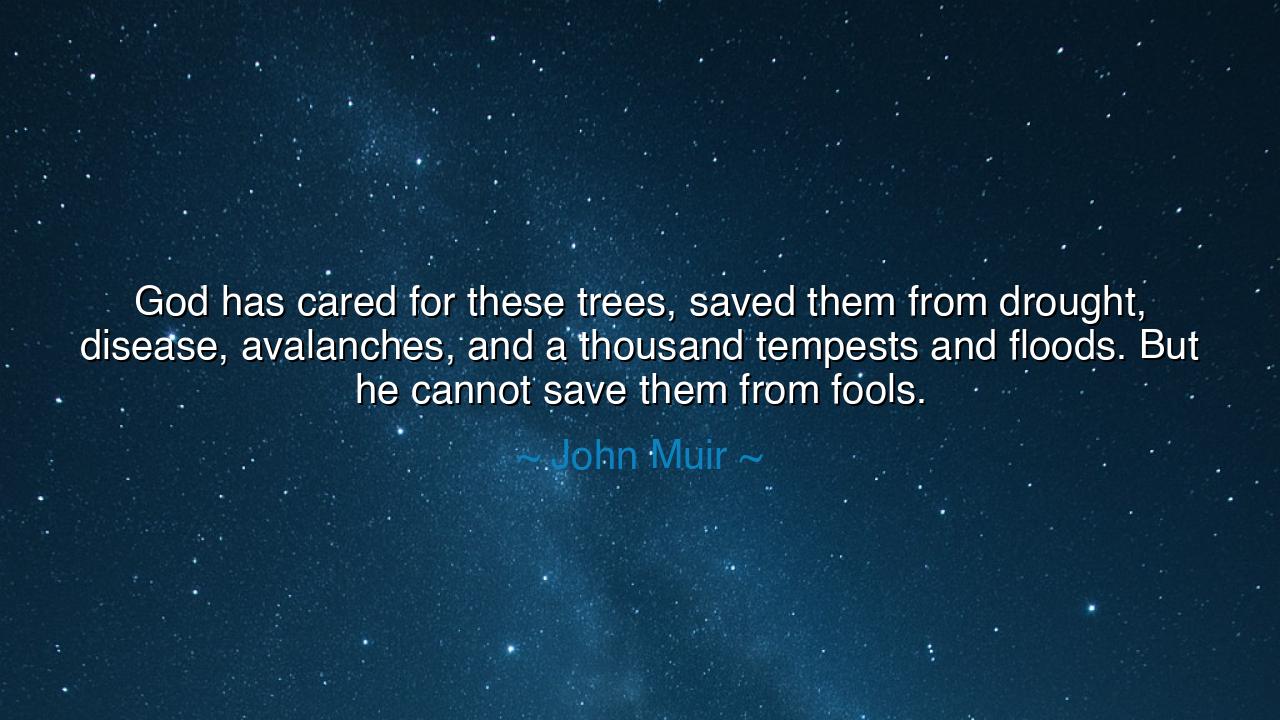
God has cared for these trees, saved them from drought, disease
God has cared for these trees, saved them from drought, disease, avalanches, and a thousand tempests and floods. But he cannot save them from fools.






“God has cared for these trees, saved them from drought, disease, avalanches, and a thousand tempests and floods. But He cannot save them from fools.” — Thus wrote John Muir, the prophet of the mountains, the wanderer of Yosemite, whose heart beat in rhythm with the wind and the granite peaks. His words are not merely a lament for the loss of trees — they are a sacred cry for the soul of humanity, a warning that while nature endures the fury of the elements, it may yet perish beneath the carelessness of man. Muir’s voice, forged in solitude and reverence, reminds us that the most devastating force in creation is not fire or flood, but folly without wisdom.
In these words lies both sorrow and awe. Muir had spent his life walking among the cathedrals of creation — the ancient sequoias that had stood since before the birth of Christ, the rivers that carved the world long before human memory. He had seen storms rip through valleys, glaciers grind mountains to dust, and yet the trees — those patient sentinels — stood fast. They bent, but did not break. They healed their own wounds, drinking deeply from the eternal well of life. Yet what storms could not destroy, the hand of man could undo in an afternoon, with the swing of an axe or the fire of greed. Thus Muir’s lament: nature can withstand everything except human thoughtlessness.
Muir spoke these words at a time when the forests of America were vanishing beneath the axe of progress. The nineteenth century worshiped growth, industry, and expansion. Railroads carved their way through ancient groves, and entire mountains were stripped bare to feed the hunger of civilization. To most, this was triumph — but to Muir, it was tragedy. He saw in every tree a living testament to God’s artistry, a cathedral older than any built by human hands. His faith was not confined to churches; it was written in bark and stone, in the whisper of wind through pines. And so, when he declared that God cannot save the trees from fools, he spoke not against heaven’s power, but against humanity’s arrogance. For God gave man dominion, but not license — stewardship, not plunder.
To understand his meaning, one need only look to the story of the American bison, or the deforestation of the Amazon in our own age. These creatures and forests endured predators, droughts, and countless ages of trial, yet nearly vanished under the thoughtless advance of man. The bison, once numbering in the tens of millions, were slaughtered to near extinction — not for food, but for profit and sport. The Amazon, the lungs of the earth, still burns today, felled not by divine wrath, but by human greed. Nature, which has survived every cataclysm since time began, now trembles before a species that should have been its guardian. Truly, as Muir wrote, God cannot save His creation from fools — for the fool is the one who destroys what he does not understand, and calls it progress.
And yet, in Muir’s grief there is also a call — a call to awakening, to repentance, to reverence. His words remind us that the Creator’s work is not finished, for it is carried forward in the hands of those who love and protect. Though God may not reach down to shield each tree from the axe, He works through those who choose to defend them. Every act of preservation, every effort to heal the earth, is a form of prayer. The forest is the temple; the conservationist, the priest. To care for the earth is to care for the sacred — for we are not separate from it, but made of the same dust and breath.
From Muir’s passion was born a movement — the National Park System, a sanctuary for both nature and the human spirit. His friendship with President Theodore Roosevelt led to the preservation of Yosemite and countless other wild places. His words stirred a nation’s conscience, reminding it that greatness lies not in what we conquer, but in what we protect. The mountains he loved still stand because one man believed that reverence could be stronger than greed. His life teaches us that one voice, when guided by truth, can echo across centuries.
So let this lesson take root in your heart: the earth endures only as long as we honor it. The storms may rage, the seasons may change, but the greatest danger comes from apathy and ignorance. Be not a fool among God’s works — be a guardian. Plant trees where others cut them down. Speak for the voiceless, and tread lightly upon the soil that bears your weight. Look upon the forest not as timber, but as testimony. And remember, as Muir did, that to destroy nature is to wound the divine, for in every leaf and river, the breath of God still moves.
Thus, when you walk beneath the shade of an old tree, pause and listen. Hear the whisper of Muir’s wisdom carried in the wind: the reminder that the Creator has trusted us with His masterpiece. Storms will pass, fires will fade, but the fool’s hand — once raised in greed — can undo what ages have built. Guard, therefore, what is sacred. Protect what endures. And let your care for creation be your offering back to the God who made it.






AAdministratorAdministrator
Welcome, honored guests. Please leave a comment, we will respond soon